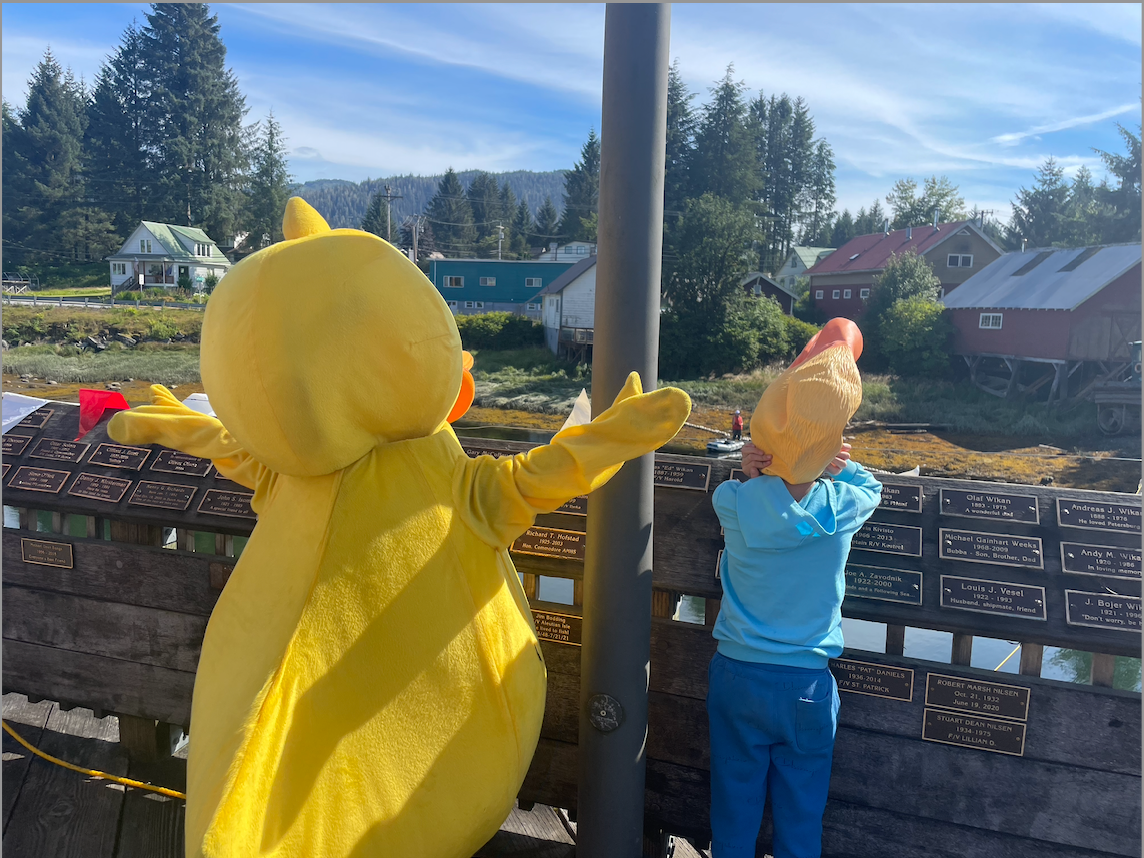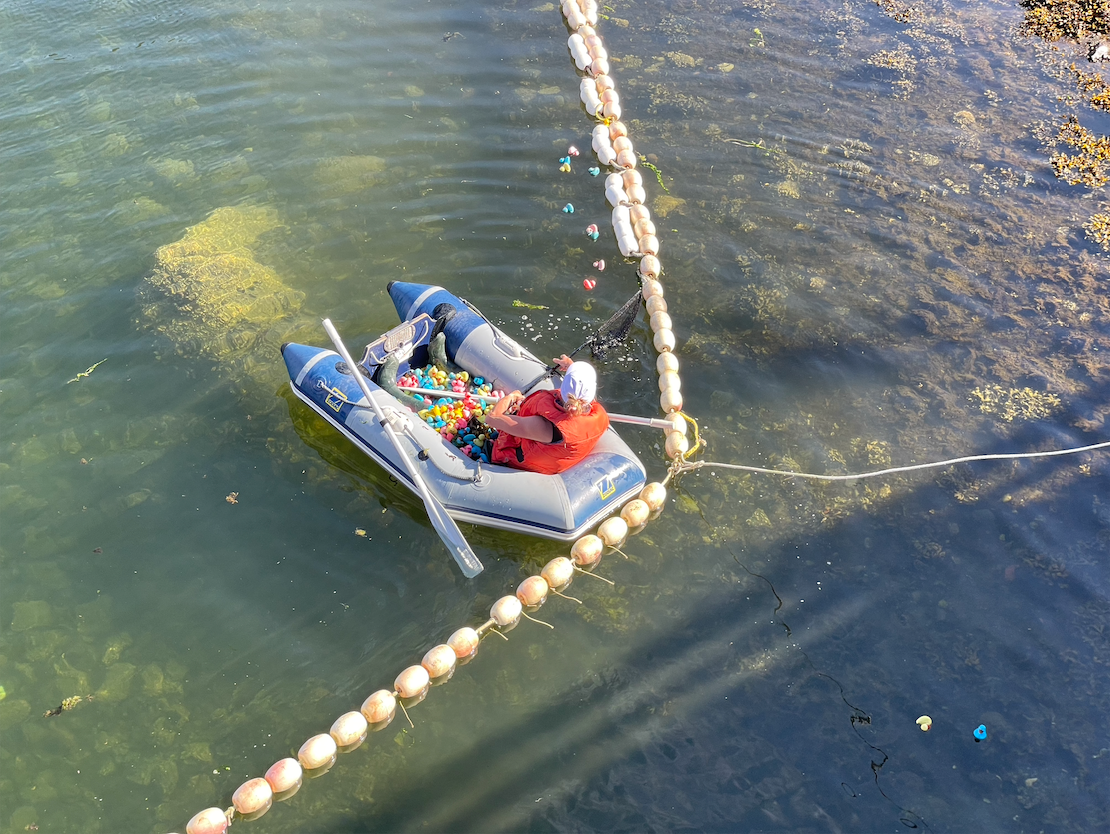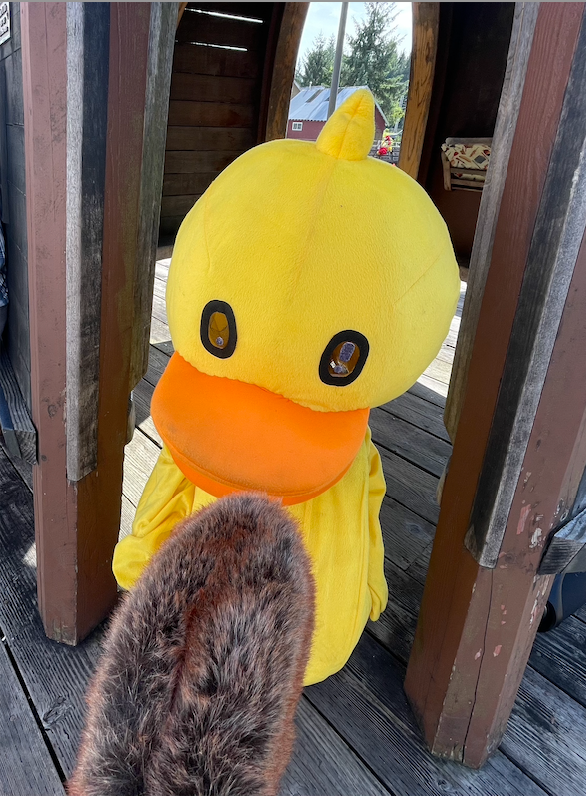
As summer draws to a close in Petersburg, the anticipation of duck season begins to build — officially starting on September 1. But before hunters take to the flats, the community gathered for a different kind of duck event. On Saturday, August 17th, over 700 rubber ducks took the plunge in the annual Rotary Duck Race. The fundraiser has become a beloved local tradition and a reminder that the town knows how to flock together for a good cause.
On the wooden boardwalk of Bojer Wikan Park, Petersburg residents were greeted by the smell of brats on the grill, the sounds of party music, and the sight of… human-sized ducks. Not really, it was just kids in various duck costumes, but looking around, it was clear that almost everyone was wearing some kind of duck-themed merchandise. It wasn’t a convention for ducks, and it wasn’t duck season yet. It was the annual Rotary Duck Race.
“We dump a bunch of plastic ducks in Hammer Slough, and they’re all numbered,” Kaili Watkins, the President of Petersburrg’s Rotary Club, said. “People buy corresponding tickets, and whichever duck makes it to the finish line, they win the grand prize.”
That grand prize was a thousand dollars, raised by the sale of the rubber ducks. All additional proceeds went towards the Rotary’s scholarship fund.
“We’re almost sold out of the 800 ducks that we put out for this event; we’ve got 740 sold right now,” Club member Dave Berg said. “We’ll raise about $5,000 on this event, should we sell all the tickets. It’s a great fundraiser for us because we give away $4,000 worth of scholarships every year to high school seniors.”
In addition to supporting local youth, the Rotary Club also helps sponsor an exchange student each year.
“We have a girl coming in from Brazil,” Berg said. “And she’s in the midst of getting her visa appointment now, so she can come to the U.S. for a year. And she’ll travel from her home in southern Brazil to Juneau, they’ll overnight there, and then Bella will come to Petersburg somewhere in the next three or four weeks.”

As Berg stepped away to assist a community member in purchasing one of the last ducks, he quipped, “We got our ducks in order!”
Anticipation built in the gathered crowd as the main event drew near. Down on the water, former club president Aaron Hankins donned a survival suit and entered the slough. Current President Watkins was coerced into a small boat. They would be in charge of capturing any rogue ducks.
“We have a cork line in the water,” Watkins said. “Theoretically, the cork line catches the ducks. Well, obviously we have some that escape, and we have to take kayaks or get our waders on and collect them with the fish nets. Last year was…
“The current was a little fast,” Hankins interjected.
“It was not good last year,” Watkins agreed. “We had lots of ducks. We had to get way over in the harbor.”
“I was in my survival suit again,” Hankins recalled. “We had a couple people, one person just in waders that floated out there with a life jacket and then two in a kayak. We made it all the way out to Ocean Beauty.”
When the last duck was sold, the racers were brought to a bridge further downstream. People gathered on the water’s edge and harbor-side bridge, waiting for the countdown. Like a rainbow waterfall, over 700 colorful rubber duckies were dumped over the edge of Nordic Drive’s bridge and splashed into the slough. The race was off. Hankins, a veteran of the duck race, offered some insider perspective on the course.
“Instead of being maximum low tide where everything’s like real narrow, they’re kind of spread out, and so on the inner shore by the Sands of Norway, you kind of have a faster current — but a lot of ducks are swinging out wide that were initially out in front, Hankins explained. “And so they kind of have a wall of ducks with the stragglers one or two ahead. Instead of being like a clear winner right out in front, it’s kind of nice when you’re like, ooh, there’s a bunch of them. It could be anyone.”
How fast the competitors would go was anyone’s guess.
“It can last 15 minutes but sometimes it’s lasted an hour and a half,” Berg recalled. “I remember when way back, incoming wind overtook the outgoing tide and ducks, and the winning duck actually got waterlogged and sank and went across the finish line upside down.”
This year, however, the ducks may have broken speed records — the winning yellow duck crossed the finish line in under seven and a half minutes, with a pink and blue duck close on its tail.
In the end, three lucky ducks — and their corresponding ticket holders — emerged victorious. Susan Shey claimed the grand prize of $1,000, Kaili Watkins took home $300 for second place, and Michelle Strickler won $200 for third place.
“I never win, that’s exciting,” Watkins remarked.
“What are you going to do with your quack money?” Hankins teased.
“My quack money is probably going to go back to Rotary,” Watkins replied.
“Oh, look at that!” Hankins responded.
“Well, the beautiful thing about this event is, it’s super fun, of course, and we like for the community to see what Rotary is and what Rotary does. And we always give back to the community,” Watkins said.
As the winnings were dispersed and spectators departed, Hankins combed the banks of the slough to collect the stragglers and lame ducks. Overall, he was pleased with this year’s clean race.
“We have no escapees. All of our ducks have been caught,” Hankins confirmed.
The event not only provided an afternoon’s entertainment to attendees but also made waves in the community by raising $7,530 for scholarships and local projects. As for the ducks themselves, they will be stored away until next year, when the Rotary Club will prove once again that they know how to have a quackin’ good time.

(Photo by Olivia Schmidt/KFSK)











